|
|
|
Sort Order |
|
|
|
Items / Page
|
|
|
|
|
|
|
| Srl | Item |
| 1 |
ID:
193588
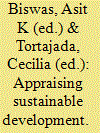

|
|
|
|
|
| Publication |
New Delhi, Oxford University Press, 2005.
|
| Description |
xviii, 223p.: table, figurespbk
|
| Standard Number |
9780195668919
|
|
|
|
|
|
|
|
|
|
|
|
Copies: C:1/I:0,R:0,Q:0
Circulation
| Accession# | Call# | Current Location | Status | Policy | Location |
| 060495 | 333.91/BIS 060495 | Main | On Shelf | General | |
|
|
|
|
| 2 |
ID:
131882
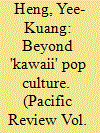

|
|
|
|
|
| Publication |
2014.
|
| Summary/Abstract |
Many studies of Japan's soft power are premised on the 'affective' dimensions of its kawaii pop culture that generate liking or interest. While entirely warranted, emphasising cultural attraction does not do sufficient justice to the multi-faceted foundations of Japanese soft power. Neither does it recognise other components of Joseph Nye's soft power framework stressing the 'normative' appeal of policies that reflect global norms. This article investigates the 'normative' dimensions of Japan's soft power on climate change, and whether it translates into international influence, as Nye predicted. The first section examines the Cabinet's 2010 New Growth Strategy, identifying a potential source of 'normative' soft power in its self-proclaimed desire to reinvent Japan as a 'trouble-shooting nation on global issues', specifically environmental challenges. Next, it analyses how Japanese entities (government, corporations, and NGOs) can transmit 'normative' soft power, and obstacles encountered. These transmission mechanisms include 'Cool Earth Partnership' programmes, the 'Future City Initiative' and the values-based Satoyama Initiative. The final section addresses conceptual implications that arise, and assesses whether Japan's 'normative' soft power has paid dividends. Drawing from literature on pioneer states and external reviews of Japan's alignment with key climate norms, the paper suggests that Japan's normative soft power is lacking in driving agendas at global climate forums. At a pragmatic problem-solving level, however, Japan is increasingly perceived as an attractive source of transferable solutions, reflecting climate norms such as developing eco-friendly technologies and providing assistance to help vulnerable countries mitigate climate change
|
|
|
|
|
|
|
|
|
|
|
|
|
|
|
|
| 3 |
ID:
130646
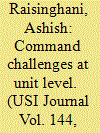

|
|
|
| 4 |
ID:
148815
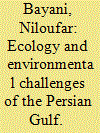

|
|
|
|
|
| Summary/Abstract |
The extreme salinity and temperature fluctuations of the Persian Gulf waters have created unique marine and coastal ecosystems, with numerous benefits to Iran and neighboring countries. However, human activities, including rapid coastal development, land-based pollution, oil and gas extraction, and shipping, are threatening the survival of these ecosystems. With long shorelines, a large coastal population, and locally important fisheries and tourism-related jobs, Iran has a lot at stake in the degradation of its marine and coastal environments. However, it is not too late to put a stop to further degradation. This article recommends a number of targeted actions at the local, national, and regional levels to address the threats to the Persian Gulf ’s environment and protect this important renewable resource.
|
|
|
|
|
|
|
|
|
|
|
|
|
|
|
|
| 5 |
ID:
133677


|
|
|
|
|
| Publication |
2014.
|
| Summary/Abstract |
Growing concerns about the slow revival of the world economy, volatility in oil prices, overcapacity in shipping and fierce competition is denting profits in the shipping industry. On the other hand, emergence of greenhouse gas emissions and pollution control regimes at sea is forcing ship owners to make expensive technical modifications onboard ships, which are further driving up the costs of operations. In such a rapidly changing scenario, there is a need for a long-term vision for transitioning to an era of sustainability in the international shipping industry. The paper commences with a discussion on the concept of sustainability as applicable to the shipping industry and highlights the recent developments in the maritime domain, which pose significant environmental and economic challenges for the shipping industry. It identifies the emerging trends in the shipping industry and argues that these challenges also present a window of opportunity for the industry, for undertaking a paradigm shift towards sustainable shipping. It further explores the transition pathways and presents various options that can be implemented in the shipping industry, which will aid its transition towards sustainability. Using a case study, the paper highlights the key characteristics of sustainable shipping and briefly discusses the Indian maritime scene before concluding that the adaptability of the world shipping industry to adopt the practices of sustainability is fundamental to its survivability in forthcoming decades.
|
|
|
|
|
|
|
|
|
|
|
|
|
|
|
|
| 6 |
ID:
113795
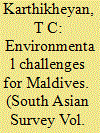

|
|
|
|
|
| Publication |
2010.
|
| Summary/Abstract |
This article looks into the environmental challenges that Maldives, an island country in the South Asian region, is facing. It studies all possible sources of environmental challenges with inherent vulnerabilities of the country in terms of its geographic and environmental conditions, and analyses important contributing factors such as global warming, sea level rise, tourism and environmental degradation and, more importantly, the 2004 tsunami. The article particularly examines the effects of global warming on Maldives on the basis of the Intergovernmental Panel on Climate Change's (IPCC) report on climate change. The impact of the tsunami and its repercussions on the Maldives's ecological fragility are also discussed. Towards the conclusion, this article focuses on the need of the Maldivian government to formulate appropriate policies and also, at the same time, the difficulties in realising those policies.
|
|
|
|
|
|
|
|
|
|
|
|
|
|
|
|
| 7 |
ID:
148809
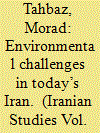

|
|
|
|
|
| Summary/Abstract |
Drought, increased population, war, air pollution, climate change, industrial and agricultural production, sanctions, inefficient water and natural resource use, and lack of enforcement of existing environmental regulations have contributed to Iran’s current environmental crisis. Insufficient water resources are forcing people to migrate, putting pressure on others. Aquifers are being drained. Air pollution has made living conditions in Iran’s cities increasingly challenging. Wind erosion is furthering the desertification of agricultural land, creating greater production demand on remaining arable areas. Biodiversity is under threat. On the other hand, Iran’s environmental future can be positively influenced by the collaboration of the public, private and non-profit sectors. Awareness and education, along with greater financial and human resources, will be necessary to tackle the problem.
|
|
|
|
|
|
|
|
|
|
|
|
|
|
|
|
| 8 |
ID:
096154
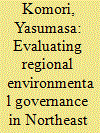

|
|
|
|
|
| Publication |
2010.
|
| Summary/Abstract |
Since the early 1990s, many regional and subregional environmental frameworks and programs have been created in Northeast Asia. In this article, the author assesses the extent to which these schemes have translated into a higher level of environmental governance. He argues that despite remarkable institutional development, regional environmental governance is at an embryonic stage. Its weakness stems from three factors in particular: (1) the primacy of national governments and the limited role of nonstate actors, (2) the lack of a coordinating mechanism among overlapping environmental initiatives, and (3) the lack of tangible outcomes in terms of mitigating environmental degradation.
|
|
|
|
|
|
|
|
|
|
|
|
|
|
|
|
| 9 |
ID:
034841
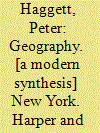

|
|
|
|
|
| Publication |
New York, Harper and Row, Publishers, 1972.
|
| Description |
xx, 483p.Hbk
|
| Series |
Happer and Row Series in Geography
|
| Standard Number |
06042575X
|
|
|
|
|
|
|
|
|
|
|
|
Copies: C:1/I:0,R:0,Q:0
Circulation
| Accession# | Call# | Current Location | Status | Policy | Location |
| 010524 | 910/HAG 010524 | Main | On Shelf | General | |
|
|
|
|
| 10 |
ID:
115962
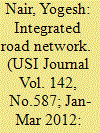

|
|
|
| 11 |
ID:
127928
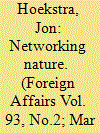

|
|
|
|
|
| Publication |
2014.
|
| Summary/Abstract |
Conservation is for the first time beginning to operate at the pace and on the scale necessary to keep up with, and even get ahead of, the planet's most intractable environmental challenges. New technologies have given conservationists abilities that would have seemed like super powers just a few years ago. We can now monitor entire ecosystems -- think of the Amazon rainforest -- in nearly real time, using remote sensors to map their three-dimensional structures; satellite communications to follow elusive creatures, such as the jaguar and the puma; and smartphones to report illegal logging.
|
|
|
|
|
|
|
|
|
|
|
|
|
|
|
|
|
|
|
|
|